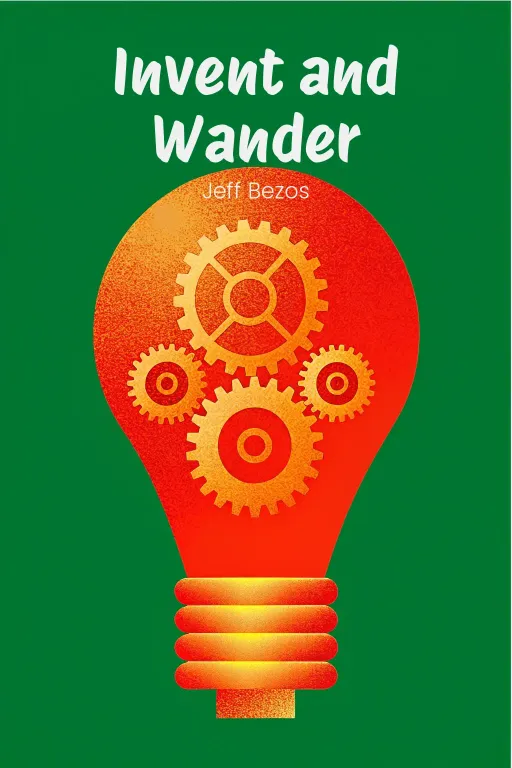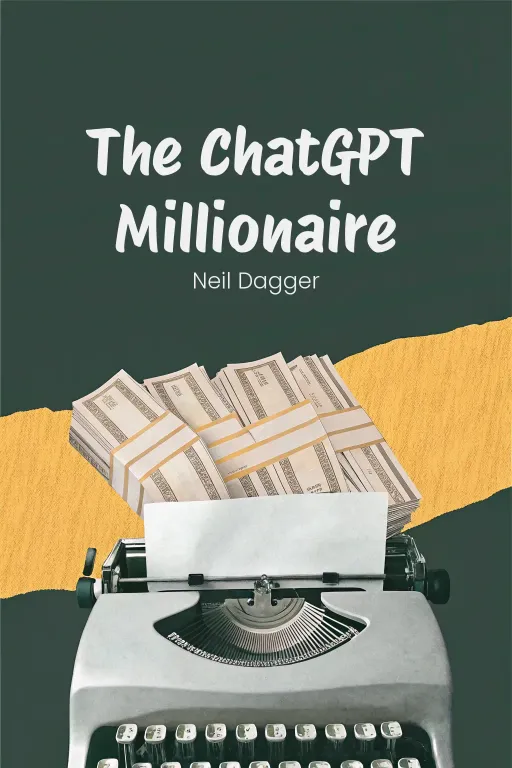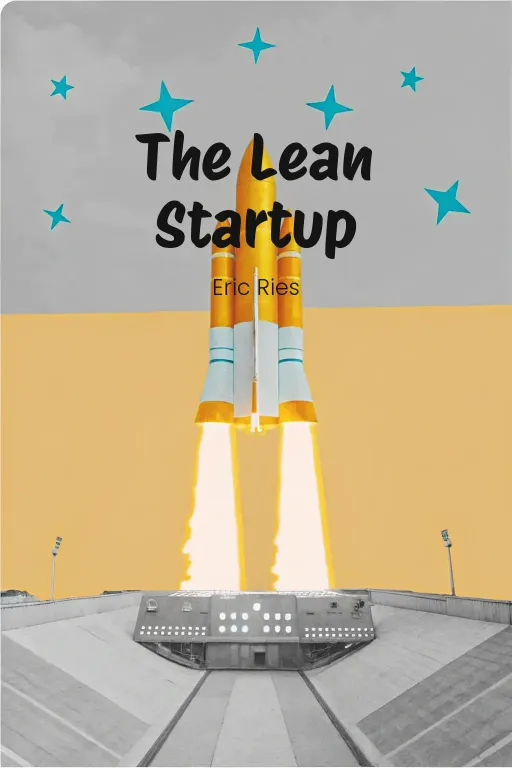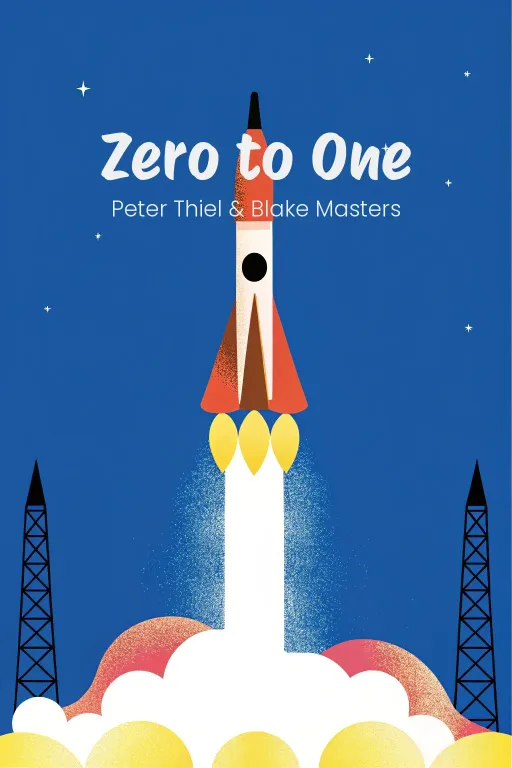
Bezos's Blueprint: 3 Steps to Dominate
Podcast by Wired In with Josh and Drew
The Collected Writings of Jeff Bezos
Introduction
Part 1
Josh: Hey everyone, welcome to the show! Today, we're diving deep into the world of Jeff Bezos—a name synonymous with, well, pretty much everything these days. Whether you're an entrepreneur, a tech geek, or just someone who's ever clicked "buy now" on Amazon, his mindset has probably impacted your life. Drew: Exactly. Jeff Bezos, the guy who transformed selling books online into a global behemoth where you can, I don't know, buy everything from solar panels to cloud computing services. Whether you admire him or scrutinize him, you have to admit, his vision is incredibly bold. Josh: Absolutely! And that's what "Invent & Wander: The Collected Writings of Jeff Bezos" encapsulates so well. This book is a collection of his shareholder letters, speeches, and thought pieces, giving us a peek into the principles that built Amazon. It’s all about that relentless focus on the customer and a totally fearless attitude toward trying new things. Drew: Right. And it's not just about how to run Amazon. Bezos also delves into bigger topics: climate change, corporate ethics, and even our future among the stars. It's almost like a manual for turning crazy ideas into real-world game-changers. Josh: So, in this episode, we're breaking down Bezos's philosophy into what we see as three central pillars. First, there's customer obsession—and we're talking about building real trust, not just making people happy. Then there's innovation, where constant experimentation isn't just a good idea, it's essential. And finally, there's the long-term vision—the guiding star behind those huge gambles, like launching AWS or Blue Origin. Drew: Three pillars, huh? Sounds solid. But are there any hidden weaknesses? I guess that's what we're here to find out. So, buckle up, everyone—we're going to get inspired, ask tough questions, and “really” dissect Bezos's roadmap to success.
Customer Obsession
Part 2
Josh: Okay, let's dive into the first and most crucial pillar: customer obsession. If there's one thing Bezos “really” wanted to embed in Amazon’s DNA, it's that everything starts and ends with the customer. It's not just something they say; it's literally the foundation of Amazon's operations and growth. Drew: Exactly, and "obsession" is a strong word, right? Most companies aim for customer satisfaction, but "obsession"? That’s another level entirely. It’s almost as if Bezos, back in the garage days, decided, "We're not just making customers happy; we're rewiring the entire shopping experience around their every single desire." Josh: Precisely, Drew. And it begins with the fundamentals – like competitive prices. When Amazon first came on the scene, they were incredibly focused on offering the lowest prices. Bezos believed that earning customer trust wasn’t just about marketing hype, but tangible value. If a customer sees you consistently offering the best prices, it breeds trust, and that turns into loyalty. Drew: Sure, but "low prices" seems kind of obvious, doesn’t it? Everyone wants them. What was so different about Bezos’s approach? Josh: Well, Bezos didn't treat lower prices as a gimmick or a temporary thing. He understood that it set an expectation. Customers started to see Amazon as the place they could trust. If they needed something, they automatically went to Amazon first, assuming they’d find the best price or the best value. Drew: Right, and you can see why that took off. Once that trust is there, it’s a game-changer. Suddenly the competition isn't just other retailers, its “Can anyone even match this level of consistency?” But I wonder, was this strategy risky in the early days? With such thin profit margins, how did Amazon avoid going bust? Josh: Of course, it was risky! Bezos himself admitted that this commitment to building long-term trust meant sacrificing short-term profits. But he was convinced it would pay off eventually—and it did. The loyalty Amazon built through its customer obsession became the backbone of its success. Bezos was definitely playing the long game, and it clearly paid off. Drew: I get it, keep prices low, build loyalty, repeat. It's logical, even if some accountants probably lost sleep over it. But surely price isn’t everything customers care about, is it? Josh: Absolutely not! The other huge piece of the puzzle is selection and convenience. Bezos’s original vision for Amazon was to create the ultimate "everything store." Launching with books, he completely reimagined what online retail could be. Instead of a few dozen titles like in a traditional bookstore, customers suddenly had access to millions of options right at their fingertips. Drew: That was truly revolutionary. I remember when Amazon first launched; you didn’t just search for a book; you discovered ones you didn't even know existed. It felt endless. But offering that kind of selection must’ve created logistical nightmares, no? Josh: Definitely. But Bezos saw those challenges as opportunities. When he allowed third-party sellers onto Amazon through Marketplace, that was a “real” game-changer. Suddenly, Amazon didn't have to stock everything themselves. Small businesses could list their products on the platform, massively increasing Amazon’s selection. It was a win-win situation—sellers got a global audience, and customers got even more choice. Drew: Smart move. Instead of hogging the spotlight, Bezos built a stage for everybody else—and got the biggest applause. But doesn’t Marketplace have some downsides? There’s been criticism about Amazon competing with its own sellers. It's like inviting someone to dinner and then eating all their food. Josh: That's a fair point—it’s a delicate balance. But from the customer's perspective, it's all part of Amazon providing unparalleled convenience. That’s “really” key. And it directly links into another major focus: speed. Bezos knew early on that in a world increasingly driven by instant gratification, delivery speed could become Amazon's ultimate weapon. Drew: Prime, of course, the Prime phenomenon. It’s amazing how quickly we've all come to expect two-day—or even two-hour—delivery. But when Prime first came out? It was mind-blowing. Josh: Totally. It was a logistical marvel. Prime didn't just meet expectations, it raised them for the entire retail industry. Bezos saw that by making delivery faster, Amazon could fundamentally change customer behavior. People suddenly felt comfortable ordering last-minute gifts or necessities, knowing that Amazon would deliver. Drew: It’s kind of crazy when you think about it. Forgotten toiletries on vacation, late birthday gifts—Amazon turned itself into an answer for all our… let's call them "human moments." But scaling something like Prime can’t have been easy. How did they manage to keep up with demand? Josh: They invested massively in infrastructure. From strategically placed fulfillment centers near high-demand areas to innovations in automated sorting and delivery tracking, Amazon rebuilt logistics from the ground up. And remember Prime Now, that two-hour delivery service? It wasn’t just about speed. It redefined what customers thought was even possible. Drew: Okay, here's my devil's advocate question. Does all this speed and convenience come at a cost? I’m not just talking about operational costs – there always seems to be some headline about the culture in those fulfillment centers. Josh: Those are definitely valid concerns, and Amazon's workplace culture has been under scrutiny. But from a purely customer-centric perspective, Bezos’s obsession with satisfaction has undeniably had results. And the speed isn’t just about quick gratification; it’s directly tied to reliability. Customers know that they can rely on Amazon now, even in a pinch. Drew: True. And speaking of trust, didn’t Bezos also focus on learning from complaints? I read that he treated customer dissatisfaction as a valuable resource. Josh: Absolutely. It's a defining characteristic of Amazon. Look at frustration-free packaging, for example. Customers complained about excessive and hard-to-open packaging, and instead of ignoring it, Amazon completely overhauled the system. They reduced packaging waste and made products easier to open, all based on customer feedback. Drew: That speaks volumes. Most companies dread complaints, but Bezos turned them into opportunities for innovation. It's almost like the company’s motto should be, "Your pain is our progress." It’s clever—and effective.
Innovation and Risk-Taking
Part 3
Josh: So, this customer-centric way of thinking naturally pushes you towards innovative solutions and, yes, taking risks to keep up with what customers want. Bezos understood early on that just focusing on the here and now wouldn't cut it. Amazon needed to be ahead of the curve, anticipating what customers might want, sometimes even before they knew it themselves. And that meant making some pretty bold bets. Drew: And when you say "bold bets," you're talking about things like AWS, the Kindle, Alexa—game-changing moves, right? But let's be real, none of these were guaranteed home runs. I bet a lot of people thought these ideas were crazy at the time. Josh: Absolutely, Drew. Let's take AWS as a perfect example. Back in the early 2000s, cloud computing was still a pretty new concept. The idea of businesses relying on someone else's infrastructure instead of running their own data centers? Risky! But this risk actually came from Amazon solving its own problems. Their own teams were struggling with the inefficiencies of managing IT as the company grew. So, instead of just fixing things internally, Bezos saw an opportunity to create a solution for everyone. Drew: That's actually genius, isn't it? "Let's take our pain and turn it into a product we can sell to everyone else." Still, wasn't AWS a huge leap for an e-commerce company? I mean, suddenly playing in the tech infrastructure space? Wasn't that way outside their comfort zone back then? Josh: Completely. And that's what makes it so impressive. AWS wasn't about sticking to what Amazon already knew. It was about redefining what the company could be. Bezos believed they weren't just an e-commerce company; they were a tech company, period. He called AWS a "big winner that paid for lots of experiments," and he was right. Services like EC2 and S3 completely changed how businesses operate, giving them affordable, scalable tech infrastructure on demand. Drew: And AWS didn't just help existing companies, it enabled new ones. Remember BandPage? They went from almost no servers to doubling their server capacity overnight, all thanks to AWS's elasticity. Without something like AWS, companies like that just couldn't have scaled so quickly, right? Josh: Exactly! It's this "build for scale" mentality that makes AWS so impactful. Amazon took a huge risk betting on the future of cloud computing, and look at it now—it's one of their biggest revenue streams, bringing in over $60 billion a year. Drew: And to think, something that seemed so niche back then is now something almost every company relies on. Okay, I'll give you that one—smart gamble. But let's talk about something a little more physical: the Kindle. Josh: Ah, the Kindle. Classic Bezos—disrupting an industry that everyone thought was immune to disruption. When the Kindle came out in 2007, the publishing world was still very much about print. Digital reading was barely on the radar, and most people didn't think consumers would be interested. Drew: Because holding a real book is such a "timeless experience," right? I can just hear the skeptics. Introduce a digital device, and suddenly paperbacks are an endangered species. Josh: <Laughs> All you want, but the skepticism was real. But Bezos still went for this ambitious goal of making every book ever printed available in 60 seconds. The technological challenges were huge. They had to create a lightweight, user-friendly device with amazing battery life and convince publishers to offer a comprehensive digital library. Drew: That's a lot of pieces to get right. So, how did Bezos—how did Amazon—actually get people to try e-readers? Josh: Two things: vision and execution. Bezos understood that customers didn't want to compromise. They wanted a reading experience that was as good as paper, or even better. And the Kindle delivered with its e-ink technology and instant downloads. Then you had KDP, Kindle Direct Publishing. This gave independent authors a way to bypass traditional publishing, putting their work directly in readers' hands, and with better royalties, might I add. Drew: Let me guess: This was also part of Bezos’s master plan to somehow “democratize access." Because it's not just about the device. He wanted to flip the whole publishing industry on its head, right? Josh: Exactly, Drew. KDP empowered authors to reach a global audience without gatekeepers, which completely changed the power dynamic in publishing. What started as a risky bet on consumer behavior became a revolution in how books are created and consumed. Drew: Okay, Kindle gets a pass. It definitely changed some minds. But if we're talking about high-risk ideas with an uncertain future, Alexa takes the cake. I mean, what kind of leap of faith do you need to create a voice assistant before voice assistants were even a thing? Josh: Alexa is a perfect example of Bezos's belief that long-term innovation needs those huge risks. As you said, conversational AI wasn't exactly mainstream in 2014. Developing Alexa meant a massive investment in natural language processing, machine learning, and AI—all fields that were still pretty new at the time. Drew: And we can't forget about building customer trust. With something so integrated into people's lives, of course privacy concerns were going to be a big deal. Honestly, if the headline back then had been "Amazon's AI is listening to everything you do," I can see why people would be hesitant. Josh: Absolutely, but Bezos's philosophy was to embrace that uncertainty, not run from it. By introducing Alexa with the Amazon Echo, they were planting their flag in what they believed was the future of tech: a seamless, voice-driven interface. The vision was to make tech as intuitive as having a conversation. Drew: I'll hand it to them, it worked. Alexa isn't just about setting timers or playing music anymore. It's become the front door to smart home technology. Thermostats, light bulbs... Alexa's gone from being a quirky gadget to a household centerpiece. Josh: Exactly. And Amazon's willingness to jump in with bold, unproven ideas is what set Alexa apart. They not only created a new market, but they also got customers to imagine completely new ways of interacting with technology. Drew: But let's not pretend every experiment has been a success, though, right? Need I remind you of the Fire Phone? Josh: Oh, the Fire Phone—a perfect example of how even Bezos admits they sometimes miss the mark. It just didn't have what customers wanted, and it flopped completely. But—and this is key—Amazon didn't see it as a defeat. The lessons they learned about user experience and market research went straight into refining future successes, like Alexa. Drew: True, Bezos embraces failure almost a little too comfortably. I mean, who else is constantly telling their team to fail big? Josh: And that's what makes his approach to innovation so unique. Failure is built right into Amazon's DNA. It’s seen as a necessary cost of experimenting. Big wins like AWS, the Kindle, and Alexa wouldn't exist without that willingness to take risks, even if it means facing some setbacks along the way.
Long-Term Thinking
Part 4
Josh: So, this kind of innovation needs a long-term view to keep growing and handle whatever comes next. That leads us to the last, and maybe most important, idea in Jeff Bezos’s thinking: long-term thinking. It's more than just planning; it's how he makes decisions about everything, from turning Amazon into a giant to thinking about our future in space. Drew: Long-term thinking, huh? Okay, I'll play along. But let's be a little skeptical here. Isn't "long-term thinking" just a fancy way of saying, "We'll make money eventually, promise?" I mean, Amazon didn't make a profit for years. Most investors wouldn't have been that patient, right? Josh: That's a fair point. A lot of companies would have crashed under that kind of pressure. But Bezos didn't see profit as the immediate, most important thing. Instead, he thought it would naturally come from building something that lasts. His idea is about getting as much cash as possible in the future, not just hitting targets every three months. Drew: So, he wasn't trying to impress the people on Wall Street with good numbers every quarter? Josh: Exactly. Early on, Amazon made choices that were better for the future, even if they lost money in the short term. Take Prime, for example. When it started in 2005, everyone thought offering unlimited two-day shipping for a fixed price was a crazy idea that was incompatible with profitability. But Bezos saw Prime as more than just a short-term gain. He wanted to create customer loyalty for life. Now, Prime has over 200 million members worldwide and is essential to Amazon’s whole system. Drew: That's pretty smart, I have to admit. But let's not forget that businesses need money coming in. How do you convince shareholders to be okay with losing billions of dollars? Wasn't Amazon called "Amazon.toast" at some point because the company would fail at any minute? Josh: Oh, for sure. During the dot-com crash in the late '90s, Amazon was losing tons of money. Bezos’s famous response to the critics was to push even harder. Instead of panicking, he made his strategy match his saying: "It’s always Day One." That meant focusing on what customers want, constantly coming up with new ideas, and building the base for the future. The early years were tough—Amazon lost nearly $3 billion. But by the end of 2001, they finally had their first profitable quarter. Drew: Okay, I’ll give him credit, that first profitable quarter must have felt great after years of people doubting him. Beyond just the money, though, what about being able to bounce back? Did that focus on long-term growth help Amazon get stronger during tough times? Josh: Definitely. For Bezos, being able to bounce back isn't just a result of thinking long-term; it’s the main point. Think about how Amazon changed during the Great Recession. While other companies were cutting back, Amazon kept putting money into its infrastructure, customer service, and new things like AWS. Drew: Ah, yes, AWS—the side project that became a goldmine. Josh: Exactly! And that fits perfectly with how Bezos approaches big projects. By thinking far beyond what the company can currently do, they weren’t just fixing problems right away but also getting ready for what might be needed in the future. AWS, for instance, wasn't just an IT solution for Amazon—it was a big step forward that changed whole industries. Drew: You have to admire that. Most CEOs stick to what they know—like running a retail business. Bezos? He decided cloud computing sounded like a fun way to spend his weekends. Josh: <Laughs> All you want, Drew, but that willingness to try new things is what makes Amazon what it is. It’s the same thinking that led to other innovations like Kindle, Alexa, and Prime. Bezos doesn't see these as risky bets; he sees them as careful investments that will pay off years—or even decades—later. Drew: And talking about long-term investments, we have to mention Blue Origin. Bezos’s space exploration work seems like the ultimate example of his long-term thinking. I can’t decide if it’s incredibly visionary or just the world’s most expensive midlife crisis. Josh: I’d say it’s visionary. Bezos often talks about “O’Neill colonies,” which are these huge, spinning space stations that could eventually house millions of people. For him, it’s not just science fiction—it’s a way to make sure humanity survives by expanding into space. Drew: Okay, but let’s be real. Colonizing the moon or living in space stations? That sounds like something a Bond villain would do. How does Bezos plan to actually make this possible? Josh: That’s where Blue Origin comes in. Bezos is investing in technologies like reusable rockets and getting resources from the moon. For example, the water ice found in the moon’s craters could be turned into hydrogen and oxygen for rocket fuel, which would greatly reduce the cost of space exploration. Drew: So he’s basically building the space version of a gas station? It's clever, if he can pull it off. But why not put all that effort and money into fixing Earth first? Josh: Bezos would say that focusing on space helps fix Earth. He believes in moving heavy industries off-planet to save resources on Earth. And really, the main goal isn’t just about exploring space—it’s about ensuring a sustainable future, which he ties back to the broader impact of long-term thinking. Drew: I’ll give him that: he’s not afraid to dream big. Whether you agree with him or not, there’s no denying that his long-term philosophy has made a big impact—not just on business, but on how we think about innovation and growth.
Conclusion
Part 5
Josh: Alright, so let’s bring it all together. Today, we dove into Jeff Bezos’s three big ideas: obsessing over the customer, taking risks to innovate, and always thinking long-term. It really boils down to his unwavering focus on the customer – building trust through great prices, tons of choices, and super-fast delivery. Then couple that with his willingness to take these huge, almost unbelievable risks – like, who thought AWS would be what it is today? Or even the Kindle! That's how he turned his vision into reality. Drew: Exactly. And it's all built on playing the long game. From making Prime something we can't live without, to betting on reusable rockets and, you know, maybe even moon colonies one day, Bezos is about building systems that are built to last, and of course, disrupt the status quo. Josh: Right. I think the big takeaway is this: if you truly want to innovate, you have to look beyond what's right in front of you. He really embraced failure as part of the process and prioritized long-term results over those quick wins. And that's something we can all apply, whether we're leading a team or just working on something ourselves. Drew: Absolutely. But, you know, we also have to be realistic. While the results are undeniably impressive, it's important to look at what gets sacrificed along the way. Bezos always says it's "Day One," right? But maybe we should be asking, "Day One for whom, exactly?" Josh: That's such a good point, Drew. So, for our listeners, here’s a little challenge: think about one area in your life, whether it’s personal or professional, where you can shift your perspective – maybe from focusing on immediate results to thinking about the long-term impact. Really think about it. Because like Bezos has shown us, the real breakthroughs happen when we start thinking beyond today. Drew: And while you're at it, maybe ask yourself: What’s your big, bold bet? Bezos built an empire by taking those risks. So, what's holding you back from making your own move? Josh: Well, on that note, we’re going to wrap it up for today. Thanks so much for joining us. We really hope this conversation has given you some food for thought, and maybe even inspired you to adopt a little of that "Day One" mentality yourself. Drew: Yeah, until next time, remember, whether you’re innovating, analyzing, or just waiting impatiently for that Prime delivery… keep learning, and keep questioning. Talk to you soon!








